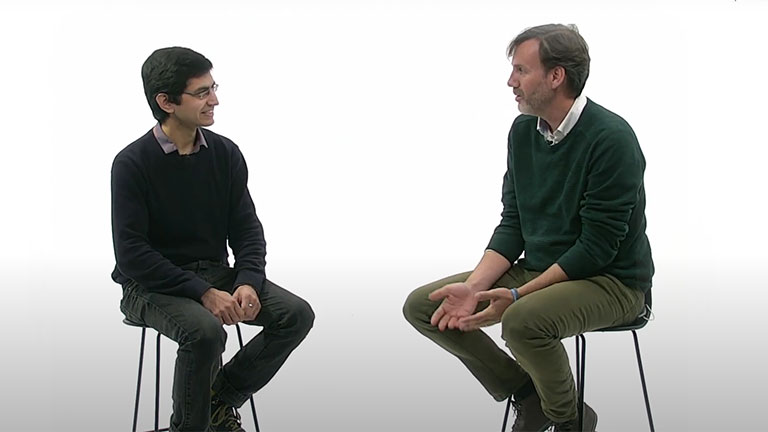
“As an upper-caste person or as a White person, you are in a position to bring change. How much time do you need?”

“As an upper-caste person or as a White person, you are in a position to bring change. How much time do you need?”
Social 18 February 2022

Caste differentiation remains a problem in India. The emigration that this Asian country has experienced in recent decades has spread its citizens around the world and, with them, cases of discrimination. Among Indian emigrants, the caste difference affects everything from selection processes to functions in organizations, always to the detriment of people of lower caste.
Ignasi Martí, director at the Esade Social Innovation Institute talks with Pardeep Singh Attri, mechanical engineer, about systemic racism and its consecuences.
TRANSCRIPT:
Ignasi Martí: Hello. Well it’s a pleasure today to be with you, Pardeep Attri, to welcome you here at Esade and to have you as one of our keynote speakers for a course on Racism.
Pardeep Attri: Thank you.
Ignasi Martí: So, it’s great to have you here, and I would like now to have a short conversation about some things that we will be discussing today with our students. The first question that I have for you is: Why do we think… Why do you think that we should talk about these issues in a business school?
Pardeep Attri: So, these issues are embedded in society, and so businesses are embedded in society. So, these issues impact everyone around organizations, societies… So the issues that are embedded in society affect organizations in a way that can harm the productivity. Diversity challenges come into play. So, students need to get prepared for the challenges that they might be facing while they are in the… when they go into the workplaces. So, to get them ready, to have this kind of open conversation around these difficult topics is important to get them ready.
Ignasi Martí: And it’s important for you, right?
Pardeep Attri: Of course, of course. Yes. Because as an instructor or as a guide I want my students to be able to engage in this conversation openly, not having any fear at all while respecting each other and being humble towards the other. This is important that I prepare my students or I prepare my colleagues in a way that we are open to this conversation that can lead to a better future for everyone.
Ignasi Martí: And, in particular, the conversation we are going to have later on, and part of the work that you do as formerly as an activist, but also now as a researcher, has to do in particular with the caste system, right? And the caste system we know it’s something that is particularly present and still very present in the Indian continent, right? Could you tell us a little bit about how the situation actually is now there so that those of us who don’t really understand what’s going on there we understand it a little bit better.
Pardeep Singh Attri: Yes, the caste system is very much prevalent in India and it’s decided when I’m born, and I cannot change it, and it’s… It does not even end when I’m dead. Our funerals happen based on our castes. So, there are separate funeral places for that, for different castes. So, even death and natural calamities like earthquakes or the tsunami that came, or the earthquakes they could not erase this caste aspect. And during the relief, during these calamities, relief was based on caste, like lower castes were denied relief. So, it’s very much prevalent and continues to affect our day-to-day life activities around like India, South Asia, mostly. But given that more and more Indians are migrating to Western countries, so, one thing that they carry with them is the caste; we don’t leave it behind; we carry it with us. So, wherever we go, it’s my kind of identity with me. So, I form similar relationships among colleagues in different countries who are from the same caste. Our marriages happen within the same caste. Most of our friendships are within the same caste. Similar things, you know, like it continues to affect everyone, yes.
Ignasi Martí: And one of the things that you mentioned is that, in fact, this is something that you can, because of immigration process. It’s something that you don’t find in India only anymore. So, you can find it in many other places. Before, at the beginning you were talking about organizations, corporations. So, this is something that you can also find, let’s say, in some of the most modern industries even…
Pardeep Attri: Yes, of course. Caste discrimination cases have been reported in the US, Australia, Canada, Spain even, UK many, Germany, many all around developed countries that are considered model countries for everyone. Wherever Indians have gone, they have taken this with them. And it continues to be reproduced within these societies. So, yes, this continues to affect wherever we go.
Ignasi Martí: Could you give us an example of what this would mean? In like a… So would this affect hiring processes? Would this affect promotion processes in organizations?
Pardeep Attri: Actually, everywhere, every stage, even before hiring like… There have been some studies that have already shown that call backs as a lower-caste person, I will get much lower callbacks for the interviews. If they submitted the same résumé and number of callbacks I get, I think, is 30% less. Similarly, when you go into the… When you step inside the organization, you are assigned different kinds of jobs, different, like lower quality jobs that do not lead to progression. You are given dead-end jobs, even though you have much better qualifications and you can do much better work. So, you are assigned different kind of roles where there is no progress. And when it comes to promotions, all the research and facts show that there’s a bias towards lower-caste people; they don’t get that much good reviews that lead to better promotions. And in terms of opportunities, again, you don’t go into the training. Like one researcher has shown that, as a lower-caste person, you don’t go into the conferences, academic conferences, so there is a big, big gap between higher-caste and lower-caste academic scholars. So, it continues to affect, even before starting the hiring process and throughout the organization. So that creates a much bigger gap like on the top level where there are only certain castes . The bottom jobs are left for the lower-castes.
Ignasi Martí: And one of… We were discussing about this before, but one of the reasons why we have in this course, as it happens in other parts of the world, you know, could be seen as a result of the Black Lives Matter movement and, let’s say, the consequences and impact of that movement all over the world, right? And one of the things that we were discussing before is that well, the Black Lives Matter movement is actually, in a way, new, but it’s not that new, because, actually, they have been fighting for a number of years for ending discrimination and so on. And you were telling me before, “Well, you know, Ignasi, I’m a millennial and I want these things to change now,” right? Could you tell us a bit about that?
Pardeep Attri: Yes, of course. Like whenever we talk about these things people say that they say that these things are changing; it will take time; it will take time; it’s progressing; we are doing some progress; we are making some progress. But it has taken a lot of time. It has taken my grandparents’ time, my parents’ time, and my uncle’s, auntie’s, everyone’s time. How much time do you need? When are you going to change? You are in a position to make change. We don’t have resources to make change. We don’t have authority to dictate things, as a lower-caste person or as an Afro-American person, we don’t have those resources, we don’t have that capability in terms of bringing this change, to dictate this change. As a position of authority, as a position of power as an upper-caste person or as a White person, you are in a position to change, to bring this change. And it’s up to you now. How much time do you need? How much time do you need?
Ignasi Martí: So, what would you tell someone like me? Well, you can see me, right? So, what would you tell someone like me? What should I do? What… How should I start?
Pardeep Attri: First thing is, I think, acknowledge you’re privilege, that you are privileged, much more privileged than, like, if I’m talking about upper-caste and lower-caste persons. You are much more privileged than me. And, at least, acknowledge that. You don’t even try to acknowledge that privilege. That needs to be acknowledged. And that will change the whole narrative on the merit… like, the whole narrative around the condition of lower-caste and relationship between upper-caste and lower-caste. That will change. If you acknowledge your own privileges and try to make some change within your own wide community. Try to make changes like don’t… What happens is that, what we have observed, that as the upper-class person, they will come and try to do some charity work within the lower-caste person and try to educate them and they think that … I’m not saying that’s bad. But, you know, that’s the kind of thing… You are taking an escape from educating your own community, like, as an upper-caste person, you go to your own community that needs to be changed much more. Change their perception; change their view point; talk to them; change them. You don’t need to change the lower-caste people because they are already… They know their pain. They already know what discrimination is. You don’t need to teach them what discrimination is. You need to teach the upper-caste people; you need to teach your own wide community among yours. Tell them that this is not right. Change has to come from them. You are… You have resources to bring that change.
Ignasi Martí: Thank you so much Pardeep for sharing this.

- Compartir en Twitter
- Compartir en Linked in
- Compartir en Facebook
- Compartir en Whatsapp Compartir en Whatsapp
- Compartir en e-Mail
Do you want to receive the Do Better newsletter?
Subscribe to receive our featured content in your inbox.